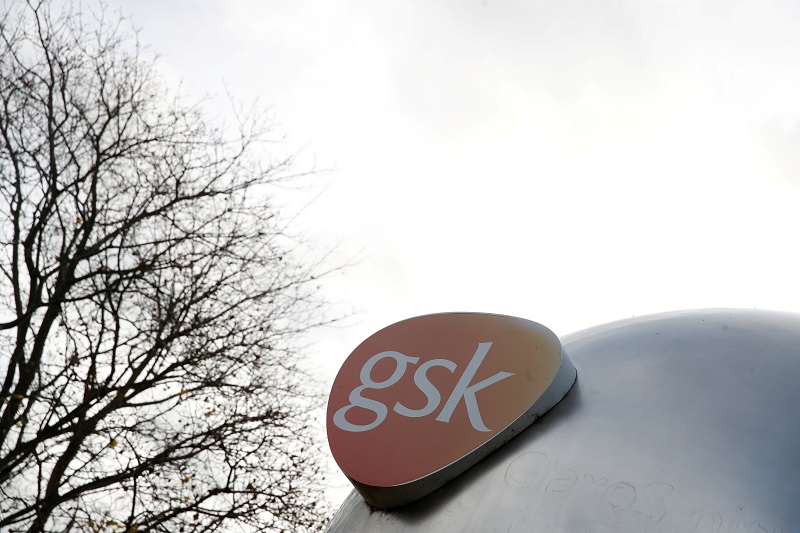GSK more upbeat on profits and COVID,
investors not sure

Company logo of pharmaceutical company GlaxoSmithKline is seen at their Stevenage facility, Britain October 26, 2020. REUTERS/Matthew Childs
GSK forecast 2021 earnings at the better end of its guidance range on Wednesday, buoyed by a recovery in routine visits to doctors and sales of its COVID-19 vaccine booster that helped the drugmaker beat second-quarter profit expectations.
But rising debts, lingering effects of the pandemic and longer-term worries about the British company's drugs pipeline saw its shares hand back initial gains.
Despite being the world's biggest vaccine maker by sales, GSK has fallen behind some rivals in combatting COVID-19, focusing on producing an adjuvant to boost the immune response of others' shots rather than making its own vaccine.
After a project with Sanofi fell short of hopes last year, GSK reported progress in the second quarter, with 258 million pounds ($358 million) in adjuvant sales. The duo's vaccine is now in late-stage trials and they hope for approvals by the end of the year.
GSK and U.S. partner Vir also announced a deal to supply their antibody-based treatment for COVID-19 to the European Union.
The British company, which is spinning off its consumer health arm to focus on improving its pharmaceuticals business with incoming funds, said it was hopeful of the positive momentum running into the second half, pushing full-year earnings towards the better end of its forecast range.
GSK has said it expects adjusted earnings will decline by a mid to high-single digit percentage this year, not including any COVID-related sales.
But some analysts remained concerned about the challenges ahead, with Hargreaves Lansdown's Nicholas Hyett pointing to "poor levels of cash generation" and rising debt.
And while Citi analysts noted "upside potential" to full-year earnings guidance, they said their focus remained on GSK's pipeline of new drugs.
Pressure to show sustainable growth has mounted on Walmsley after years of underperformance at the pharmaceuticals business. GSK has also locked horns with activist investor Elliott over its future after the planned spin-off next year.
GSK shares, which lost a quarter of their value in 2020, were down about 1% at 1,386.2 pence by 1240 GMT, after initially rising as much as 2% on the results.
A 49% jump in vaccine sales to 1.57 billion pounds and growth in newer medicines helped GSK post adjusted quarterly earnings of 28.1 pence per share, blowing past analysts' estimate of 19.9 pence. Overall sales of 8.1 billion pounds were also ahead of a 7.56-billion-pound consensus
However, GSK forecast revenues from vaccines over the full year would be broadly flat, even as some markets such as the United States open up to routine vaccinations, because COVID-19 inoculation rates are lagging in other parts of the world.
EU signs deal with GSK for supply of potential COVID drug
The drug, which is developed together with U.S. firm Vir Biotechnology, can be used for the treatment of high-risk coronavirus patients with mild symptoms who do not require supplemental oxygen, according to the Commission.
The deal is a boost to GSK work on potential treatments for COVID-19 after the company played a limited role in the development of vaccines. Rather than making its own coronavirus shot, GSK has focused on supplying its booster to other developers and has partnered with Sanofi to develop a jab.
GSK confirmed the deal in a statement on Wednesday, saying it represented "a crucial step forward for treating cases of COVID-19" in Europe. The drug is currently being assessed by the European Medicines Agency (EMA) under a rolling review.
It has received emergency authorisation in the United States to treat mild-to-moderate COVID-19 patients who are at high risk of developing a severe infection.
The contract has been backed by 16 of the 27 EU states, which can buy the drug only after it is approved by EMA or by national drug regulators. The price agreed for potential purchases has not been disclosed. A spokesman for the Commission declined to comment on the matter.
Monoclonal antibodies mimic natural antibodies that the body generates to fight infection.
The deal with GSK follows a contract the EU signed in April with Swiss pharmaceutical giant Roche to secure about 55,000 doses of a potential treatment based on a cocktail of monoclonal antibodies developed by Roche together with U.S. drugmaker Regeneron.
Apart from monoclonal treatments, the only other anti-COVID drug the EU has bought is Gilead's remdesivir, an antiviral medicine. Last year, the EU reserved half a million courses after the drug obtained a conditional EU approval.
RELATED What reliable targets for the "New GSK"?
